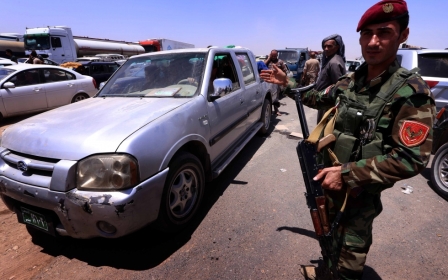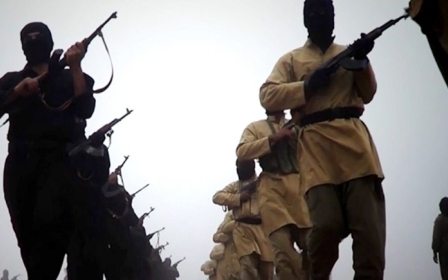Iraq's Maliki granted 'unlimited powers' as army hits back

Iraqi Prime Minister Nouri al-Maliki has announced that he has been granted “unlimited powers” by cabinet in order to allow him to combat the crisis crippling Iraq.
In a statement released on his website late on Friday, Maliki spoke of the “unified position” of politicians, as well as the army and police forces and said that Iraq was “a sacred country that cannot be defiled by ISIL gangs.”
Maliki's announcement seemed to indicate that he is claiming similar authority to that awarded a prime minister by a state of emmergency. Under the constitution, in an emergency the prime minister is given the "necessary powers," the specifics of which are to be regulated by law. The Iraqi parliament met on Thursday to discuss imposing a state of emergency, but the measures failed to pass after only 128 out of 325 Iraqi MPs showed up for the session.
Maliki also appeared live on state television on Saturday morning to discuss the crisis that has hit the country in the past week, and has seen large swaths of Iraq fall to militant headed al-Qaeda inspired group ISIL. In a statement, Maliki called on the people to avoid “sectarian language”, and to disregard media claims about the security situation in Iraq.
Army to launch counter-offensive
The US-trained army, backed by a growing crop of volunteers, is expected to begin a major counter-offensive on Saturday, with the aim of capturing the northern cities of Tikrit and Dur that fell to militants on 11 June.
The colonel from the military command responsible for Samarra, a city 110 kilometres north of Baghdad, said reinforcements from the federal police and army arrived on Friday but were awaiting orders to begin. Maliki arrived in Samarra on Friday to inspect the forces ahead of their assault and to pray at the al-Askari mausoleum, a revered Shiite shrine whose 2006 bombing by al-Qaeda sparked a sectarian conflict that killed tens of thousands. He delivered his address from the city, despite reports that ISIL had attacked the city overnight.
According to a post on ISIL's Twitter page, posted at 21:50 GMT (23:50 local time) the group launched air strikes on the city, allegedly killing tens of soldiers as well as leading figures in the military. The statement could not be independently verified, although most reports suggest that Iraq's military was able to ward off the offensive and kept its ground.
Kurdish gains
Kurdish forces have also played a major role in the fighting, leading to speculation that advances by the Peshmerga, in Kirkuk and elsewhere could be end up being permanent. On Friday evening AFP reported that the Peshmerga, or Kurdish regional government forces, were clashing with Sunni militias in Diyala province, some 150 kilometres south of Kirkuk.
Thursday saw the Peshmerga take control of Kirkuk, the oil-rich city considered by many Kurds as their historic capital which has long been disputed between Kurds and the Baghdad government.
The fighting in areas of northern Iraq has led to wide-scale internal displacement, with many refugees heading to towns in the autonomous region of Iraqi Kurdistan.
Al-Jazeera reports that the majority of those fleeing, whose numbers are estimated at 300,00 by the UN refugee agency, have sought safety in the Kurdish capital Erbil.
International reactions
There has also been widespread debate about the possibility of international intervention after the swift advance of ISIL-led fighters, and the widespread desertion of many Iraqi army troops during the early stages of the crisis.
Iran, which is supportive of Maliki’s government, has now sent in 2,000 troops to back the Iraqi army, AFP reported on Saturday.
Iran's President Hassan Rouhani has said that Iran is “ready to help” although he has not yet confirmed today’s reports about the latest Iranian troop deployment. Unconfirmed reports emerged earlier in the week that Iran had already sent two units of the Revolutionary Guard to Baghdad, Najaf and Karbala, according to Iranian security services quoted in the Wall Street Journal and CNN.
The Iranian President also told reporters that he would consider supporting US actions in Iraq, despite the two countries having had no diplomatic relations for more than 30 years.
"If we see that the United States takes action against terrorist groups in Iraq, then one can think about it," Rouhani said at a press conference marking a year since he was elected president.
"We have said that all countries must unite in combating terrorism. But right now regarding Iraq we have not seen the Americans taking a decision yet," Rouhani said, mentioning that the civil war raging in neighbouring Syria has been intensified by the West.
The US, however, has denied holding talks with Iran on the Iraq crisis, and insists that the two countries will only negotiate on the ongoing nuclear issue, with the latest round of talks kicking off in Vienna on Friday.
Despite the denials, some analysts believe that the crisis is destined to bring Iran closer to the West, and could have major repercussions in neighbouring Syria.
"Washington and London are going to find themselves on the same side as Damascus, facing what appears to be a threat to the region, the West and Europe," Frederic Pichon, author of Syria: Why the West was Wrong told AFP.
On Friday, US President Barack Obama ruled out sending troops, although he said that the White House was still mulling over other options and expects that the US will announce its strategy in the next few days.
Obama, who decided to pull all US troops out of Iraq in 2011, also had stern words for the Maliki government. Without naming the Iraqi Prime Minister, US President Barack Obama issued a brief statement from the White House lawn, warning the Baghdad government that it had brought disaster upon itself by failing to heal the divides between Sunni and Shiite camps in the country.
"Any action that we may take to provide assistance to Iraqi security forces has to be joined by a serious and sincere effort by Iraq's leaders to set aside sectarian differences, to promote stability and account for the legitimate interests of all of Iraq's communities, and to continue to build the capacity of an effective security force," he said, adding, "We can't do it for them."
Former secretary of state Hillary Clinton told the BBC late on Friday that before the US can offer Iraq and military support, Maliki will have to demonstrate that “he is a leader for all Iraqis, not for a sectarian slice of the country.”
Speaking on the programme Newsnight, she said that the army, “which has not been able to hold territory, has to have an injection of discipline and professionalism, something the US has been trying to help with."
Stay informed with MEE's newsletters
Sign up to get the latest alerts, insights and analysis, starting with Turkey Unpacked
Middle East Eye delivers independent and unrivalled coverage and analysis of the Middle East, North Africa and beyond. To learn more about republishing this content and the associated fees, please fill out this form. More about MEE can be found here.




